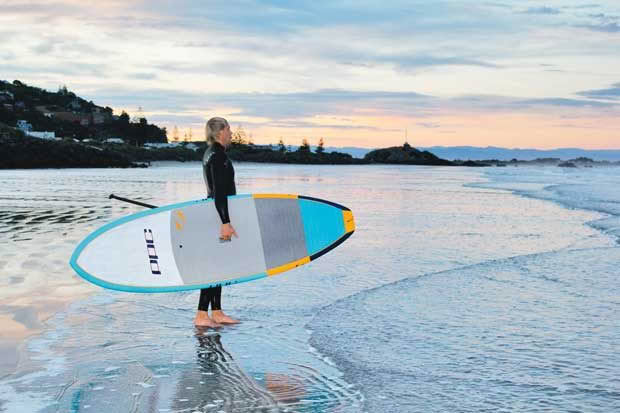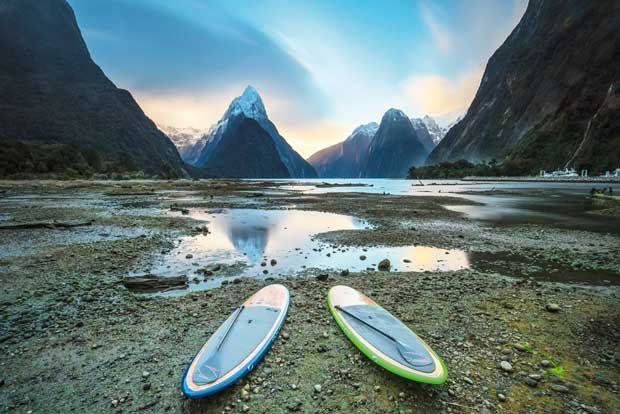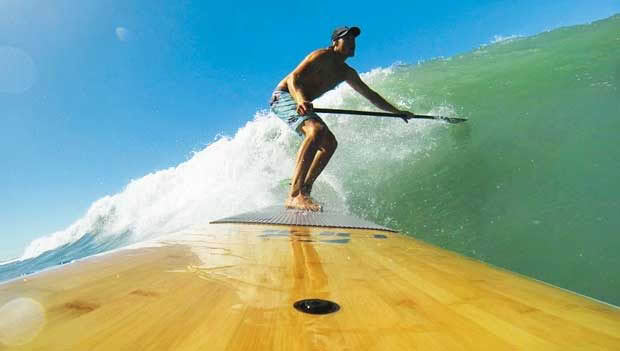Christchurch paddleboard company riding steady wave of growth

A Christchurch entrepreneur is finding success testing the waters.
Words: Emma Rawson
Sam Loader always checks the conditions before paddling the waves at his local beach, Sumner in Christchurch. And testing the water before leaping in has also proved a good business strategy for 30-year-old Sam. He started small when he launched Pacific Paddle Company (PPC) in 2012, just as the paddleboarding craze was hitting New Zealand shores, but now PPC is a global business with a projected annual turnover of $1 million. “At the beginning, we only manufactured small quantities and this helped us refine the design and test different materials such as bamboo and carbon fibre,” he says.
Stand-up paddleboarding (or SUP) has its origins in ancient Polynesia and was first marketed as a recreational sport in Hawaii in 2006. It’s believed to be one of the fastest-growing recreational sports in the world and SUP yoga (yoga on a paddleboard) is also quickly catching on. Sam funded the business using his savings of $50,000. Since its launch PPC’s sales have increased by 30 per cent each year. Sam runs the company on his own and exports to the United States, Australia and Sweden. PPC’s range, which includes inflatable and racing boards, can be used in surf, rivers and on lakes. Sam designs the boards in New Zealand and has them manufactured in China and Thailand.

This year the government agency Callaghan Innovation awarded PPC a $5,000 grant to develop The Interceptor. Designed for speed, this innovative carbon fibre racing board lowers the rider’s centre of gravity, while its flattened “rocker” (the banana bend of the board) makes it quicker over the water, while the bow create bubbles under the board to reduce friction. Sam intends the board to be the world’s fastest. “It’s like an aircraft wing. On a plane they try to break up the air; on water the goal is to create bubbles. That’s because something moving through very smooth water will have a lot of friction and will be slower.”
ELEVATOR PITCH
Where possible, PPC boards are made using environmentally friendly materials. Many are made from bamboo, which is a sustainable fast-growing wood that’s lightweight and strong. PPC is a premium brand available only at pacificpaddlecompany.com. This online, direct-to-customer model keeps overheads low, and enables Sam to stay close to buyers and thus able to respond quickly to the market. Storage is one of PPC’s biggest expenses.

TAILWINDS
A contract with Westpac Hotpoints lifted sales and Sam is now negotiating to be the official SUP yoga board supplier to the Wanderlust Yoga Festival. Wanderlust is an international festival with 45 annual events, each of which attract more than 10,000 attendees.
HEADWINDS
The decision not to sell at retail was challenging at the start. “People want to touch and feel the board, and we were competing against major windsurfing brands.” He increased his brand’s visibility through Facebook advertising, Google AdWords and search engine optimization to boost the company’s online presence.
WHAT NEXT?
Sam is eyeing other European markets and in 2017 will move to Noosa for four months to grow the Australian business. Sam wants PPC to be the most sustainable paddleboard business in the world. He is exploring building boards from innovative materials such as the off-cuts from shoe inner soles.
THE NUMBERS
$1 million projected turnover in 2016
30% growth each year since 2012
$1500–$3000 price of a board
$5000 Callaghan Innovation funding (40% of $12,500 research and development project)
25% of sales exported to Australia
Love this story? Subscribe now!
 This article first appeared in NZ Life & Leisure Magazine.
This article first appeared in NZ Life & Leisure Magazine.
